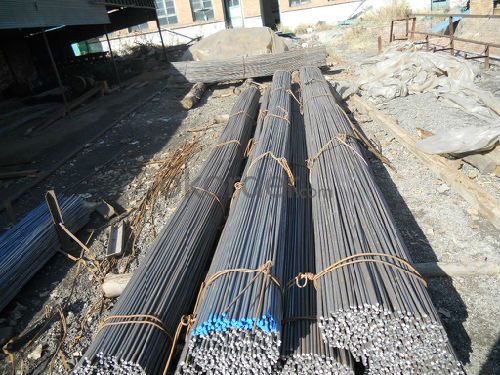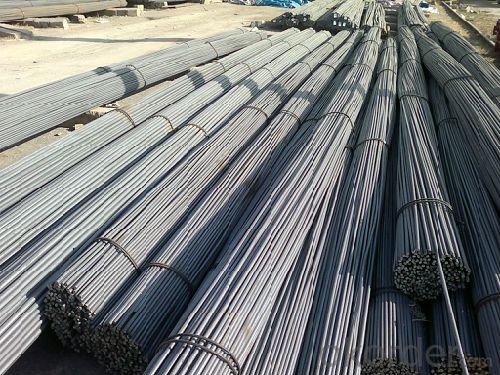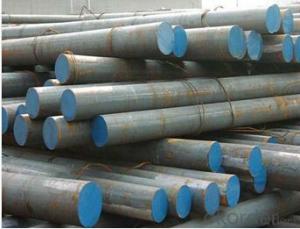Chinese Standard High Prime Round Bar Steel
- Loading Port:
- China Main Port
- Payment Terms:
- TT or LC
- Min Order Qty:
- -
- Supply Capability:
- -
OKorder Service Pledge
OKorder Financial Service
You Might Also Like
Product Description:
OKorder is offering Chinese Standard High Prime Round Bar Steel at great prices with worldwide shipping. Our supplier is a world-class manufacturer of steel, with our products utilized the world over. OKorder annually supplies products to European, North American and Asian markets. We provide quotations within 24 hours of receiving an inquiry and guarantee competitive prices.
Product Applications:
Chinese Standard High Prime Round Bar Steel are ideal for structural applications and are widely used in the construction of buildings and bridges, and the manufacturing, petrochemical, and transportation industries.
Product Advantages:
OKorder's Steel Chinese Standard High Prime Round Bar Steel are durable, strong, and resist corrosion.
Main Product Features:
· Premium quality
· Prompt delivery & seaworthy packing (30 days after receiving deposit)
· Corrosion resistance
· Can be recycled and reused
· Mill test certification
· Professional Service
· Competitive pricing
|
Specifications of Chinese Standard Round Bar
1. Grade: Q195, Q235, Q345
2. Diameter: 6mm-150mm
3. Length: 6m, 9m, 12m or as customer’s request
4. Tolerance: Within ±5% for weight; ±2mm for diameter
5. Note: The price can be better is the quantity is good
6. Chemical composition
Alloy No | Element (%) | ||||
C | Mn | S | P | Si | |
Q195 | 0.06-0.12 | 0.25 | ≤0.05 | ≤0.045 | ≤0.3 |
Q235 | 0.12—0.20 | 0.3—0.7 | ≤0.045 | ≤0.045 | ≤0.3 |
Q345 | ≤0.2 | 1.00-1.60 | ≤0.045 | ≤0.045 | ≤0.55 |
Usage and Applications of Chinese Standard Round Bar
1. Chinese standard steel bar is often used where large amounts of steel need to be formed, for example as structural steel.
2. And we can use this kind of product on the performance of the mechanical parts if the demand is not very high.
3. Steel round bar is used in construction and a large number of architectural and engineering structures.
Packaging & Delivery of Chinese Standard Round Bar
Packaging Detail: All goods are packed in bundle with steel strips and shipped by break bulk vessel or container (depend on target market and different ports)
Delivery Detail: 45 days
Trade terms: FOB, CFR, CIF
MOQ: 25 tons per specification; we can negotiate the quantity if the specification is normal or we have stock of one specification.
Weight: The price invoicing on theoretical weight basis or actual weight basis depends on customer’s request.
Shipment: The shipment of bulk break or container is depends on customer’s request and the situation of the port of destination.
Documents given: Full set of original clean on board bill of lading; Original signed commercial invoice; Original packing list; Policy of insurance; Certificate of origin and what the target market needs.
Production Flow of Chinese Standard Round Bar
1. The common processes are preheated forging quenching, dual refinement solution process, cooling quenching and isothermal quenching. We use heat treatment for dual refinement solution process.
2. Material prepare (billet) — heat up — rough rolling — precision rolling — cooling — packing — storage and transportation
Characteristics of Chinese Standard Round Bar
1. The steel in which the main interstitial alloying constituent is carbon in the range of 0.12–2.0%.
2. As the carbon percentage content rises, steel has the ability to become harder and stronger through heat treating; however it becomes less ductile.
3. Quality should be in conformity with the specification of the manufacturer. Quantity and packing conditions should be in conformity with the term in the contract.
4. Regardless of the heat treatment, higher carbon content reduces weld ability. In carbon steels, the higher carbon content lowers the melting point.
FAQ:
Q1: Why buy Materials & Equipment from OKorder.com?
A1: All products offered byOKorder.com are carefully selected from China's most reliable manufacturing enterprises. Through its ISO certifications, OKorder.com adheres to the highest standards and a commitment to supply chain safety and customer satisfaction.
Q2: How do we guarantee the quality of our products?
A2: We have established an advanced quality management system which conducts strict quality tests at every step, from raw materials to the final product. At the same time, we provide extensive follow-up service assurances as required.
Q3: How soon can we receive the product after purchase?
A3: Within three days of placing an order, we will begin production. The specific shipping date is dependent upon international and government factors, but is typically 7 to 10 workdays.


- Q:Can steel round bars be coated or painted?
- Yes, steel round bars can be coated or painted. Coating or painting steel round bars serves several purposes, such as preventing corrosion, enhancing aesthetics, and providing additional protection against environmental factors. Coatings and paints can be applied to steel round bars using various methods, including powder coating, electroplating, or wet paint application. These processes involve preparing the surface of the steel round bar by removing any existing rust or contaminants, followed by the application of the chosen coating or paint. The type of coating or paint used will depend on the specific requirements of the steel round bars, such as the intended use, environmental conditions, and desired appearance. Coating or painting steel round bars can significantly extend their lifespan, improve their visual appeal, and ensure their durability in various applications.
- Q:How are steel round bars used in the manufacturing of material handling equipment?
- Steel round bars are commonly used in the manufacturing of material handling equipment due to their strength and durability. These bars are often used as components in the construction of various equipment, such as cranes, forklifts, conveyors, and hoists. One of the primary applications of steel round bars in material handling equipment is for the construction of load-bearing structures. For example, in cranes and hoists, steel round bars are used to create the mast, boom, and jib, which need to withstand heavy loads and provide stability. The high tensile strength and resistance to bending of steel make it an ideal choice for these critical components. Additionally, steel round bars are used for shafts and axles in material handling equipment. These components play a crucial role in transmitting power and torque, allowing the equipment to operate efficiently. Steel's ability to withstand high stress and torsional forces makes it a suitable material for these applications. Another common use of steel round bars in material handling equipment is for the fabrication of lifting attachments and hooks. These bars are often shaped and welded to create the required lifting mechanism, ensuring that they can safely lift and transport heavy loads. The strength and rigidity of steel make it capable of withstanding the forces exerted during lifting operations. Furthermore, steel round bars are used in the manufacturing of conveyor systems. These bars are utilized as rollers or shafts to support and guide the movement of materials along the conveyor belts. The smooth surface of the steel bars reduces friction, allowing for efficient material handling. In summary, steel round bars play a vital role in the manufacturing of material handling equipment. Their strength, durability, and versatility make them suitable for various applications, including load-bearing structures, shafts, lifting attachments, and conveyor systems.
- Q:What are the advantages of using heat-treatable steel round bars?
- There are several advantages to using heat-treatable steel round bars. Firstly, heat treatment allows for increased strength and hardness, making the bars suitable for applications that require high durability and load-bearing capacity. Secondly, heat-treatable steel round bars can be easily machined and fabricated into various shapes and sizes, providing flexibility in design and manufacturing processes. Additionally, heat treatment enhances the bars' resistance to wear, corrosion, and fatigue, increasing their lifespan and reducing maintenance costs. Lastly, the ability to customize the heat treatment process enables the bars to meet specific performance requirements, making them a preferred choice in industries such as automotive, aerospace, and construction.
- Q:What are the different types of steel round bar profiles?
- In the market, one can find various steel round bar profiles. Among the most commonly used profiles are: 1. Plain Round Bar: This profile is the most basic and widely used. It consists of a solid cylindrical bar with a smooth surface and a consistent diameter throughout its length. 2. Deformed Round Bar: This type of round bar features deformations or ribs on its surface. These deformations enhance the bond between the bar and concrete, making it ideal for construction applications requiring reinforced concrete structures. 3. Hollow Round Bar: As the name suggests, this profile has a hollow center. It is often utilized in industries where weight reduction is crucial or when the round bar needs to serve as a conduit for fluids or gases. 4. Threaded Round Bar: This profile is characterized by threads along its length, enabling easy screwing into other components. It is commonly employed in applications that require secure fastening or adjustability. 5. Half-Round Bar: With one flat side and one rounded side, this profile takes on a semi-circular shape. It is frequently used in decorative applications, such as handrails, where an aesthetically pleasing appearance is desired. 6. Square Bar: Although not strictly a round profile, square bars are often included in this category. They possess four equal sides and find common use in applications that demand higher torsional strength. 7. Hexagonal Bar: Similar to square bars, hexagonal bars have six equal sides. They are often employed in applications that require high torque resistance or when a distinctive appearance is desired. These represent just a few of the available steel round bar profiles. The selection of a profile depends on specific application requirements, such as structural strength, bonding capabilities, or aesthetic considerations.
- Q:What are the typical price ranges for steel round bars?
- The typical price ranges for steel round bars can vary depending on various factors such as the type of steel, the diameter, length, and the quantity being purchased. Generally, steel round bars can range in price from $1 to $5 per foot for common carbon steel grades. However, specialty and high-grade steel round bars can be priced higher, ranging from $5 to $20 per foot or even more. Additionally, larger diameter or longer length steel round bars may also be priced higher due to increased material and manufacturing costs. It is important to note that these price ranges are approximate and can vary based on market conditions, supplier pricing, and other factors. To get an accurate price range, it is recommended to contact steel suppliers or distributors for specific quotes based on your requirements.
- Q:Can steel round bars be hot worked?
- Yes, steel round bars can be hot worked. Hot working refers to the process of shaping or forming steel while it is at an elevated temperature. This temperature is typically above the recrystallization temperature of the steel, which allows for easier deformation and shaping. Hot working of steel round bars can be done through processes such as hot rolling, hot forging, or hot extrusion. These processes involve applying heat to the steel bar and then using mechanical force to shape it into the desired form. Hot working is commonly used in the manufacturing of various steel products, including round bars, to improve their mechanical properties and achieve specific shapes or sizes.
- Q:Can steel round bars be welded to other materials?
- Yes, steel round bars can be welded to other materials. Welding is a common method used to join different materials together, including steel round bars and various other materials such as aluminum, stainless steel, and even non-metallic materials like plastics. However, it is important to note that the compatibility of the materials being welded is crucial for a successful weld. The welding process requires the use of appropriate welding techniques, filler metals, and sometimes pre-heating or post-weld heat treatment to ensure a strong and durable bond between the steel round bar and the other material. It is also important to consider the specific application and the properties required for the joint to determine the most suitable welding method and materials.
- Q:What is the maximum chromium content allowed for steel round bars?
- The maximum chromium content allowed for steel round bars depends on the specific grade or specification of the steel. Generally, the chromium content in steel round bars can range from 0.15% to 30%, but this can vary greatly depending on the intended application and desired properties of the steel. Higher chromium content is often found in stainless steel grades, which are known for their corrosion resistance. It is important to consult the relevant industry standards or specifications to determine the maximum chromium content allowed for specific steel round bars.
- Q:What are the different types of steel round bar alloys used in the marine industry?
- Various steel round bar alloys are utilized in the marine industry due to their strength, corrosion resistance, and other specific properties necessary for marine applications. Some commonly used alloys in this industry are: 1. Stainless Steel: Stainless steel, especially grades like 316 and 304, sees extensive use in the marine industry. These alloys possess exceptional corrosion resistance, making them suitable for marine environments where exposure to saltwater and moisture is common. Stainless steel round bars are also renowned for their high strength and durability. 2. Carbon Steel: Carbon steel round bars are another popular choice in the marine industry. They are known for their strength and toughness, making them suitable for various marine applications. However, carbon steel is more susceptible to corrosion compared to stainless steel, so proper maintenance and protective coatings are necessary. 3. Duplex Stainless Steel: Duplex stainless steel round bars, such as SAF 2205, are gaining popularity in the marine industry due to their superior corrosion resistance and high strength. These alloys possess a balanced microstructure of ferrite and austenite, providing excellent resistance to pitting, crevice corrosion, and stress corrosion cracking. 4. Copper-Nickel Alloys: Copper-nickel round bars, specifically alloys like 90/10 (90% copper and 10% nickel) and 70/30 (70% copper and 30% nickel), find widespread use in the marine industry. These alloys offer excellent resistance to seawater corrosion, erosion, and biofouling. Copper-nickel alloys are commonly employed in seawater piping systems, heat exchangers, and condensers. 5. Aluminum Alloys: Despite not being steel, aluminum round bars are also utilized in the marine industry, particularly for lightweight applications. Aluminum alloys, such as 6061 and 5083, provide good corrosion resistance and a high strength-to-weight ratio. They are commonly employed in boat building, mast structures, and other marine components. It is important to consider specific application requirements, environmental conditions, and budget considerations when selecting steel round bar alloys in the marine industry. Consulting with marine engineers and industry experts can aid in choosing the most appropriate alloy for a particular marine application.
- Q:What is the typical yield strength of a steel round bar?
- The yield strength of a steel round bar can vary depending on the grade of steel used. Most common grades of steel typically have a yield strength ranging from 36,000 to 80,000 psi. It should be noted that this range is a general guideline and there may be exceptions and variations among different grades of steel. The yield strength can also be influenced by factors such as the manufacturing process and any additional treatments or heat treatments applied to the steel. Therefore, it is advisable to consult the specific material specifications or seek advice from a metallurgical expert for accurate and precise information on the yield strength of a particular steel round bar.
1. Manufacturer Overview |
|
|---|---|
| Location | |
| Year Established | |
| Annual Output Value | |
| Main Markets | |
| Company Certifications | |
2. Manufacturer Certificates |
|
|---|---|
| a) Certification Name | |
| Range | |
| Reference | |
| Validity Period | |
3. Manufacturer Capability |
|
|---|---|
| a)Trade Capacity | |
| Nearest Port | |
| Export Percentage | |
| No.of Employees in Trade Department | |
| Language Spoken: | |
| b)Factory Information | |
| Factory Size: | |
| No. of Production Lines | |
| Contract Manufacturing | |
| Product Price Range | |
Send your message to us
Chinese Standard High Prime Round Bar Steel
- Loading Port:
- China Main Port
- Payment Terms:
- TT or LC
- Min Order Qty:
- -
- Supply Capability:
- -
OKorder Service Pledge
OKorder Financial Service
Similar products
New products
Hot products
Related keywords

































